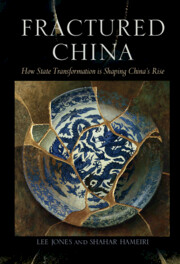15 results
EU Regulatory Polity 3.0 for Compliance with the Rule of Law: When Depoliticising Goals Lead to Uneven Politicisation
-
- Journal:
- European Journal of Risk Regulation , First View
- Published online by Cambridge University Press:
- 29 October 2024, pp. 1-17
-
- Article
-
- You have access
- Open access
- HTML
- Export citation
6 - The Myth of Rural Radicalism
-
- Book:
- Reviving Rural America
- Published online:
- 20 June 2024
- Print publication:
- 27 June 2024, pp 130-155
-
- Chapter
- Export citation
6 - Corporate Governance under Market Experimentation
- from Part III - Law and Political Economy in Corporate China
-
- Book:
- Law and Political Economy in China
- Published online:
- 10 August 2023
- Print publication:
- 24 August 2023, pp 107-125
-
- Chapter
- Export citation
4 - China’s International Development Financing
-
- Book:
- Fractured China
- Published online:
- 21 October 2021
- Print publication:
- 28 October 2021, pp 166-214
-
- Chapter
- Export citation
Introduction
-
- Book:
- Fractured China
- Published online:
- 21 October 2021
- Print publication:
- 28 October 2021, pp 1-19
-
- Chapter
- Export citation
2 - State Transformation and the South China Sea
-
- Book:
- Fractured China
- Published online:
- 21 October 2021
- Print publication:
- 28 October 2021, pp 72-120
-
- Chapter
- Export citation
3 - Chinese Non-Traditional Security Governance in the Greater Mekong Subregion
-
- Book:
- Fractured China
- Published online:
- 21 October 2021
- Print publication:
- 28 October 2021, pp 121-165
-
- Chapter
- Export citation
Conclusion
-
- Book:
- Fractured China
- Published online:
- 21 October 2021
- Print publication:
- 28 October 2021, pp 215-232
-
- Chapter
- Export citation
1 - State Transformation and Chinese Foreign Policy
-
- Book:
- Fractured China
- Published online:
- 21 October 2021
- Print publication:
- 28 October 2021, pp 20-71
-
- Chapter
- Export citation

Fractured China
- How State Transformation Is Shaping China's Rise
-
- Published online:
- 21 October 2021
- Print publication:
- 28 October 2021
How the European Central Bank and Other Independent Agencies Reveal a Gap in Constitutionalism: A Spectrum of Institutions for Commitment
-
- Journal:
- German Law Journal / Volume 22 / Issue 6 / September 2021
- Published online by Cambridge University Press:
- 15 September 2021, pp. 999-1027
-
- Article
-
- You have access
- Open access
- HTML
- Export citation
2 - The Regulatory State and the Labour Process
- from Part II - Systems, Processes, and Dynamics of Governance in Higher Education
-
-
- Book:
- Convergence and Diversity in the Governance of Higher Education
- Published online:
- 21 November 2020
- Print publication:
- 19 November 2020, pp 43-67
-
- Chapter
- Export citation
The politics of blame avoidance in complex delegation structures: the public transport crisis in Berlin
-
- Journal:
- European Political Science Review / Volume 11 / Issue 4 / November 2019
- Published online by Cambridge University Press:
- 16 October 2019, pp. 415-431
-
- Article
- Export citation
The new politics of energy security and the rise of the catalytic state in southern Europe
-
- Journal:
- Journal of Public Policy / Volume 38 / Issue 4 / December 2018
- Published online by Cambridge University Press:
- 23 May 2017, pp. 511-551
-
- Article
- Export citation
Making the Law Work: Alberta's Liquor Act and the Control of Medicinal Liquor from 1916 to 1924*
-
- Journal:
- Canadian Journal of Law & Society / La Revue Canadienne Droit et Société / Volume 27 / Issue 2 / August 2012
- Published online by Cambridge University Press:
- 02 January 2013, pp. 249-265
-
- Article
- Export citation

